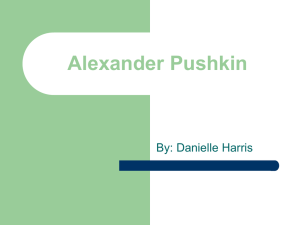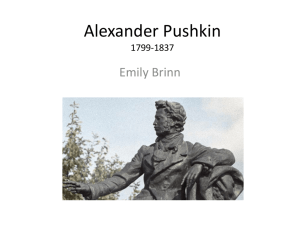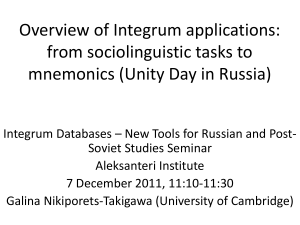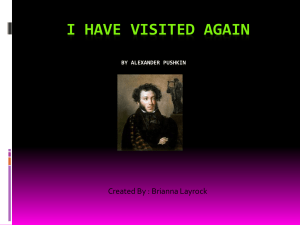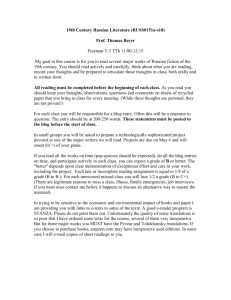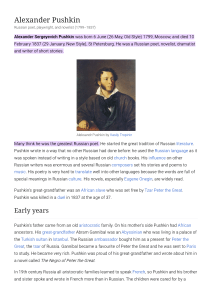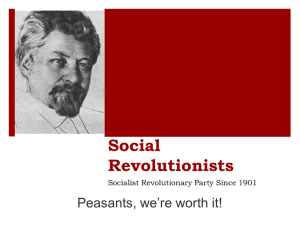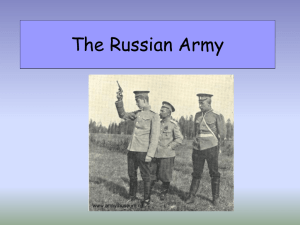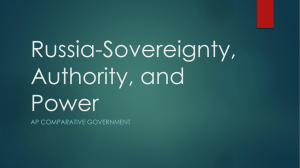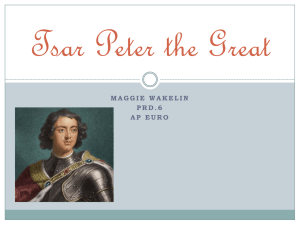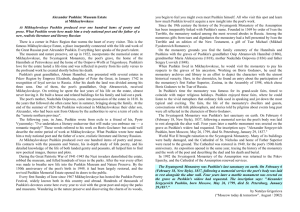Russian Literature
advertisement
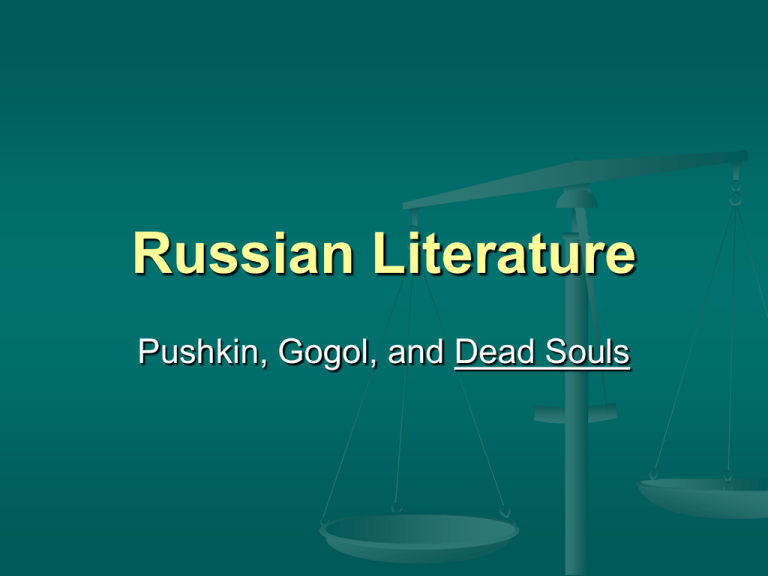
Russian Literature Pushkin, Gogol, and Dead Souls Russia Today Russia to 1800 Having adopted the light of Christianity from Byzantium, [Russia] took part in neither the political revolutions, nor the intellectual activity of the Roman Catholic world. The great epoch of the Renaissance had no influence here. ... Russia had a lofty calling . ... Its boundless plains swallowed the force of the Mongols and stopped their onslaught at the edge of Europe. ... During the epoch of storms and great changes, tsars and boyars agreed about one thing: the necessity of bringing Russia closer to Europe. --Alexander Pushkin, 1836 Russia to 1800 1703: Peter the Great founds St. Petersburg, officially cementing Russia’s desire to become European Throughout the 18th Century, Russia, fought and won wars against Sweden, Turkey, and (in the early 19th century) France In about 100 years, Russia went from a backwards nation of farmers to the largest nation on Earth Russian Literature Before 1800 Russia’s contribution to art before 1800 consists of two things: several “Lives of Saints” (Russianstyle) and icons by Andrei Rublev (Right) Literature before 1800 largely consisted of imitation of French poetry and prose Alexander Pushkin 1799-1837 Russian literature really began with Pushkin Pushkin did for Russian what Shakespeare did for English by adding scores of words and phrases to the lexicon, virtually reinventing the language Pushkin also introduced new styles and genres to Russian and introduced European authors to the Russian people Finally, he mixed foreign elements with natural speech, focusing on folk tales and common people On Pushkin Every nation has national symbols reflecting its self-awareness. For the people of Russia Pushkin, his prose and poetry, is a cornerstone of national culture, first of all because with his works he actually built the contemporary Russian language, and the language for a nation is perhaps the main property distinguishing it from other nations. He was a brilliant poet indeed. What is this reflected in? First of all in the surprisingly precise poetic expressions abounding in aphorisms. In this sense Pushkin's language is amazing, because it is lapidary and polysemantic. Many of his phrases have become catch-words. They penetrated the consciousness of even those people who read his works not too attentively. Nevertheless this is our habitual linguistic environment, this is what people take in with their mother's milk from generation to generation. It's also important that Pushkin wrote culturally significant works for all age groups. Children read his tales, adolescents his romantic poems and novels, adults his philosophic dramas. Pushkin accompanies us, the Russians, from cradle to grave. Pushkin is viewed as the forefather of new Russian literature. He marked the beginning of almost all modern genres of Russian prose: from travel notes and essays to historic and philosophical novels. Aleksei Anikin, http://www.vor.ru/culture/pushk200_eng.html “The Bronze Horseman” About statue (right) of Peter the Great in St. Petersburg Focuses on majesty of capital city vs. struggles by average people to build that city in the middle of a swamp It is, essentially, Russia’s national poem by its national poet Nikolai Gogol 1809-1852 Born in Ukraine to humble family Early work consisted of stories about Ukraine peasant life (often with supernatural elements thrown in) His first collection of stories, Evenings on a Farm Near Dikanka (1832), was an instant success. In these stories, he settled on a key to his style: mixing the humorous and the macabre Later stories would use humor, the macabre and the supernatural in more modern settings like St. Petersburg (see his famous stories “The Nose” and “The Overcoat”) He also wrote several well-received plays, including “The Inspector General” Poshlost Poshlost is an untranslatable Russian word for “banality, with a characteristic national flavoring of metaphysics and high morality, and a peculiar conjunction of the sexual and the spiritual. This one word encompasses triviality, vulgarity, sexual promiscuity, and a lack of spirituality. The war against poshlost is a cultural obsession of the Russian and Soviet intelligensia from the 1860s to the 1960s” (Boym, 1994) Term “poshlost” is also defined as “self-satisfied inferiority,” both moral and spiritual (though that might be too much of a simplification). “He [Pushkin] used to say of me that no other writer before me possessed the gift to expose so brightly life’s poshlust, to depict so powerfully the poshlust of a poshlusty man in such a way that everybody’s eyes would be opened wide to all the petty trivia that often escapes our attention” (Gogol, 1843) Dead Souls Volume One was published in 1842 The idea for the novel was suggested by Pushkin (Gogol’s friend and champion) He wrote much of the novel while living in Italy (he mentions this at certain points, like the end of Volume One) The novel was referred to both as “an epic poem in prose” and “a novel in verse” (latter a homage to Pushkin’s Eugene Onegin) Dead Souls originally was supposed to be three parts in length, like Dante’s Divine Comedy. Gogol never got to the third part, and most of part two was destroyed by the author days before his death. Structure is clear, though: Chichikov journeys through “hell” in volume one, is punished and exonerated in the “purgatory” of volume two, and is redeemed in the “paradise” of volume three. What are souls? Souls=serfs Similar to slavery--in that landowners technically “owned” their serfs Serfs worked for their masters, but they also worked their own land (and they did have their own land) Serfs paid taxes to their masters (usually in the form of food and other items), but they were also free to make money on their own and possess items for their own benefit (unlike slaves in the US) Serfs were not allowed to travel without their master’s permission Serfs in novel often called “muzhiks,” which is where we get the word “hicks” The Russian serf system was officially abolished on February 19, 1861--two years before Lincoln signed the Emancipation Proclamation freeing US slaves The end of serfdom, however, didn’t really change people’s lives in Russia, as it really meant that instead of paying taxes to masters, the people of Russia suddenly had to pay taxes to the state The reasons for the end of serfdom were economic and political: Russia needed workers for modern factories, and they needed soldiers to fight wars. The serf system had kept Russia backwards for far too long, so its end had to happen in order for progress to be made. Ironically, that “progress” led, in 1917, to the Russian Revolution and (later) the USSR. Pavel Ivanovich Chichikov Why three names? Explain Russian naming conventions. What was Gogol’s intention in naming his main character “Chichikov”? Why, in other words, is it funny? What do we learn about him in the first chapter? How does our impression of Chichikov change in the final chapter of volume one? Other Characters Manilov Korobochka Nozdryov Sobakevich Plyushkin Seliphan Petrushka
